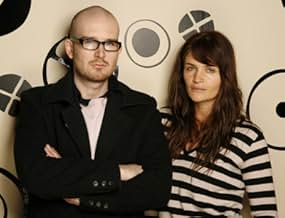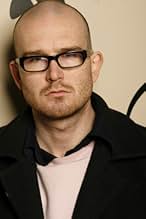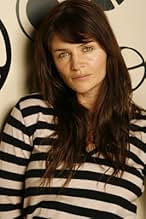Famous pianist Zetterström returns home to his native Denmark, to give a concert, just to find out that the choices he has made in his life have affected his love life greatly.Famous pianist Zetterström returns home to his native Denmark, to give a concert, just to find out that the choices he has made in his life have affected his love life greatly.Famous pianist Zetterström returns home to his native Denmark, to give a concert, just to find out that the choices he has made in his life have affected his love life greatly.
- Director
- Writers
- Stars
- Awards
- 1 win & 6 nominations total
Peder Thomas Pedersen
- Guard 1
- (as Peder Pedersen)
Susanne Storm
- Mor Til Dreng
- (as Susanne Storme)
- Director
- Writers
- All cast & crew
- Production, box office & more at IMDbPro
Featured reviews
I don't understand how the previous reviewer could accuse this film of trying to be too mysterious and of being "overexplained"--these seem inconsistent to me. For my part, I found it straightforward and a bit didactic but I do think the psychological phenomena it pointed to are worth thinking about. Those who remember "Reconstruction" will find this exercise similar in style but less ambitious. It does have its flaws--for example, the devices used to attempt to generate suspense are not very effective. I would say this film succeeds more at getting those in the audience who are attuned to the questions it raises thinking than it does as pure entertainment.
I have to say that the strength of this movie is it's simplicity. It's beautiful in a very obvious way which really hits you right in the eye. The whole movie has some sort of delicate aura draping it and although the acting, as stated by other reviewers, is not a state of the art, the music and the very beautiful footage makes this a film well worth seeing.
The story is not complicated at all. It uses a lot of symbolism and the movie writer is obviously trying to trigger our imagination by jumping in time and place (in the same style as many filmmakers before him such as Spike Jonze and Michael Gondry) trying to make the moral statement of the film looking more complex than it really is.
This is a beautiful movie, it has some original touches such as the drawn episode and hopefully you will leave the cinema feeling the same way as I did, with a warm feeling inside and the beautiful music still playing in my ears.
The story is not complicated at all. It uses a lot of symbolism and the movie writer is obviously trying to trigger our imagination by jumping in time and place (in the same style as many filmmakers before him such as Spike Jonze and Michael Gondry) trying to make the moral statement of the film looking more complex than it really is.
This is a beautiful movie, it has some original touches such as the drawn episode and hopefully you will leave the cinema feeling the same way as I did, with a warm feeling inside and the beautiful music still playing in my ears.
The Danish film, "Allegro," is that rare science fiction film that uses only the barest minimum of special effects to tell its story (a slight wrinkle in the picture is about as high tech as the filmmakers are willing to go). Instead, the fantasy and surrealism play out almost exclusively in that far more intriguing venue known as the Theater of the Mind.
Zetterstrom (well played by Ulrich Thomsen, who appeared in the excellent "Brothers" a few years back) is a concert pianist who has never been able to find true happiness in his life, even after he's met and formed a relationship with Andrea (Helena Christensen), the supposed woman of his dreams. Zetterstrom may be a brilliant musician, but he suffers from an innate distrust of other people, including those who are nearest and dearest to him. When Andrea decides to up and leave him virtually without warning, Zetterstrom imposes a form of amnesia on himself that effectively wipes out all memory of his life prior to her departure. At the same time - and this is where things really get strange - the section of Copenhagen where he was born and raised undergoes a bizarre transformation, suddenly becoming cut off from the rest of the world by some inexplicable supernatural force. Though no one can physically enter this area - now officially re-named The Zone - Zetterstrom is determined to force his way in, when, after ten years of not being able to recall his past, he begins to suspect that his memories may actually be residing in that mysterious place.
Needless to say, this is not your average science fiction movie, nor is it your average tale of lost love. But by combining these two usually distinct genres into a single story, director and co-writer (with Mikael Wulff) Christopher Boe has come up with a work that is both thought-provoking and haunting in its otherworldly strangeness. Zetterstrom wanders through the maze of this "pseudo" city like one in a trance or a dream, searching for clues to his forgotten past and trying to figure out the identity of the strange woman (Andrea) who flits in and out of the shadows of his imagination.
The message of this strange little parable seems to be that even the most tragic events of our lives make up a crucial part of who we are - and that any effort to dull the pain of those events by tucking them away in a corner far out of reach of our memory only winds up diminishing us as a person in the end. Zetterstrom learns that lesson the hard way, but at least he does learn it. It reflects well on the filmmakers that they've presented their case in as uniquely fanciful and absorbing a way as they have in "Allegro."
Zetterstrom (well played by Ulrich Thomsen, who appeared in the excellent "Brothers" a few years back) is a concert pianist who has never been able to find true happiness in his life, even after he's met and formed a relationship with Andrea (Helena Christensen), the supposed woman of his dreams. Zetterstrom may be a brilliant musician, but he suffers from an innate distrust of other people, including those who are nearest and dearest to him. When Andrea decides to up and leave him virtually without warning, Zetterstrom imposes a form of amnesia on himself that effectively wipes out all memory of his life prior to her departure. At the same time - and this is where things really get strange - the section of Copenhagen where he was born and raised undergoes a bizarre transformation, suddenly becoming cut off from the rest of the world by some inexplicable supernatural force. Though no one can physically enter this area - now officially re-named The Zone - Zetterstrom is determined to force his way in, when, after ten years of not being able to recall his past, he begins to suspect that his memories may actually be residing in that mysterious place.
Needless to say, this is not your average science fiction movie, nor is it your average tale of lost love. But by combining these two usually distinct genres into a single story, director and co-writer (with Mikael Wulff) Christopher Boe has come up with a work that is both thought-provoking and haunting in its otherworldly strangeness. Zetterstrom wanders through the maze of this "pseudo" city like one in a trance or a dream, searching for clues to his forgotten past and trying to figure out the identity of the strange woman (Andrea) who flits in and out of the shadows of his imagination.
The message of this strange little parable seems to be that even the most tragic events of our lives make up a crucial part of who we are - and that any effort to dull the pain of those events by tucking them away in a corner far out of reach of our memory only winds up diminishing us as a person in the end. Zetterstrom learns that lesson the hard way, but at least he does learn it. It reflects well on the filmmakers that they've presented their case in as uniquely fanciful and absorbing a way as they have in "Allegro."
I'm a big fan of existential folly in film, especially having completed many of my own. Zetterstrøm is the main character in this movie, a world-renowned pianist from Denmark. Since childhood, he is an assiduous "forgetter" of everything except his piano playing. This is to say that he stores up his disappointments, forgets them, and retreats behind a piano. After a love affair that ends due to his emotional constipation, he uses his facultative amnesiac skills once again, and this act is one step too far, so inimical to the fabric of reality, that a rent in reality is formed over three city blocks, and becomes referred to as the "Zone".
Zetterstrøm buries himself in his solitary existence of piano-playing, quite literally performing concerts in the dark, or behind screens so that the audience cannot see him. Shadowy figures draw Zetterstrøm back to the zone, unwilling to allow his non-confrontational existence to continue. Zetterstrøm must be made to confront his past.
It's a fascinating film, the narrator lets us know that it's Zetterstrøm's very brilliance which allows him to annihilate himself, that allows him to inoculate himself from reality.
I'm in absolute adoration of films that attempt to make visual metaphors of the human mind, such a film is this (the Zone fulfils this purpose), Tarsem films such as The Cell and The Fall are others. There is no subject more sacred, more revelatory as regards human potential. There's a scene where Zetterstrøm sits and has dinner in an ornately plastered ballroom. The windows and floor are all blacked out with plastic sheeting, and the room is covered in latched boxes loaded on pallets, representing Zetterstrøm's repressed past, there's also a cage with globes of light in, recognising the potentiality of his mind.
When there's narration we also see some very nice cartoons with Zetterstrøm as a child, that's another metaphor I'm very fond of from The Cell, that many of us are still children inside, just wounded, subdued, and with horrid barriers put up. You may have guessed that this movie moved me deeply.
Zetterstrøm buries himself in his solitary existence of piano-playing, quite literally performing concerts in the dark, or behind screens so that the audience cannot see him. Shadowy figures draw Zetterstrøm back to the zone, unwilling to allow his non-confrontational existence to continue. Zetterstrøm must be made to confront his past.
It's a fascinating film, the narrator lets us know that it's Zetterstrøm's very brilliance which allows him to annihilate himself, that allows him to inoculate himself from reality.
I'm in absolute adoration of films that attempt to make visual metaphors of the human mind, such a film is this (the Zone fulfils this purpose), Tarsem films such as The Cell and The Fall are others. There is no subject more sacred, more revelatory as regards human potential. There's a scene where Zetterstrøm sits and has dinner in an ornately plastered ballroom. The windows and floor are all blacked out with plastic sheeting, and the room is covered in latched boxes loaded on pallets, representing Zetterstrøm's repressed past, there's also a cage with globes of light in, recognising the potentiality of his mind.
When there's narration we also see some very nice cartoons with Zetterstrøm as a child, that's another metaphor I'm very fond of from The Cell, that many of us are still children inside, just wounded, subdued, and with horrid barriers put up. You may have guessed that this movie moved me deeply.
There's a fine and potentially powerful sci-fi-as-metaphor idea at the heart of this film: the notion that the painful memories you wish to repress might be actually taken from you and placed somewhere ("The Zone," a la Tarkovsky's Stalker).
The trouble is, the film is not told from the point of view of the protagonist. His emotional journey would have been powerful if the audience had been *asked to share it.* Why can't I remember more than ten years back? What happened ten years ago? What connection, if any, does my memory lapse have with the mysterious region in my former home city called "The Zone"? Who is the woman in this picture: might she be a lover I have somehow forgotten? Unfortunately, while all of these things are puzzling to our hero, the answers have already been spelled out for us, because the story has been told in a linear fashion, and is actually narrated by an omniscient voice who explains everything point-by-point, essentially before it has happened. This greatly reduces the movie's emotional impact: we are now a passive observer rather than an active participant.
It is, in other words, the anti-Memento. I've long been championing the artistic cause of puzzle movies like that one, and Donnie Darko, Eternal Sunshine, and Upstream Color ... because real life is a puzzle that lacks an omniscient narrator. I wish Boe had trusted his audience much more and dared to tell this from the proper POV: that, and better casting of the female lead, would have made this an 8/10. As it is, it is worth seeing more as an argument in favor of more challenging narrative structures.
The trouble is, the film is not told from the point of view of the protagonist. His emotional journey would have been powerful if the audience had been *asked to share it.* Why can't I remember more than ten years back? What happened ten years ago? What connection, if any, does my memory lapse have with the mysterious region in my former home city called "The Zone"? Who is the woman in this picture: might she be a lover I have somehow forgotten? Unfortunately, while all of these things are puzzling to our hero, the answers have already been spelled out for us, because the story has been told in a linear fashion, and is actually narrated by an omniscient voice who explains everything point-by-point, essentially before it has happened. This greatly reduces the movie's emotional impact: we are now a passive observer rather than an active participant.
It is, in other words, the anti-Memento. I've long been championing the artistic cause of puzzle movies like that one, and Donnie Darko, Eternal Sunshine, and Upstream Color ... because real life is a puzzle that lacks an omniscient narrator. I wish Boe had trusted his audience much more and dared to tell this from the proper POV: that, and better casting of the female lead, would have made this an 8/10. As it is, it is worth seeing more as an argument in favor of more challenging narrative structures.
Did you know
- Quotes
Zetterstrøm: - But what now... now that I regret?
Tom: - It's a bit late for that, I am afraid.
Zetterstrøm: - So, what do I do now?
Tom: - Well, you can go back to your music, if you want.
- ConnectionsReferenced in iChat mellem Boe og Wulff (2006)
Details
Box office
- Budget
- DKK 10,000,000 (estimated)
- Gross US & Canada
- $7,404
- Opening weekend US & Canada
- $505
- May 13, 2007
- Gross worldwide
- $10,208
- Runtime
- 1h 28m(88 min)
- Color
- Sound mix
- Aspect ratio
- 2.35 : 1
Contribute to this page
Suggest an edit or add missing content






























